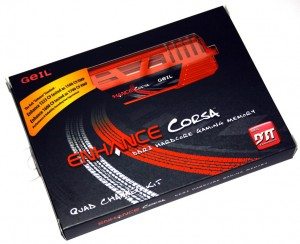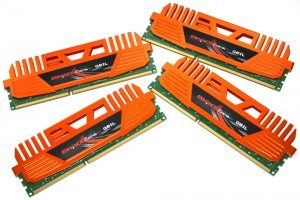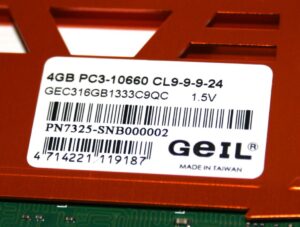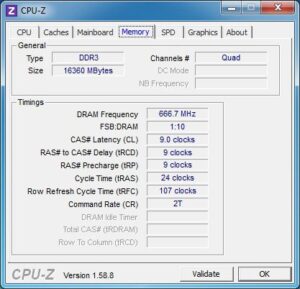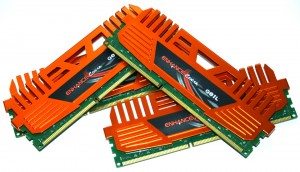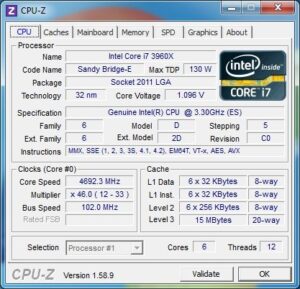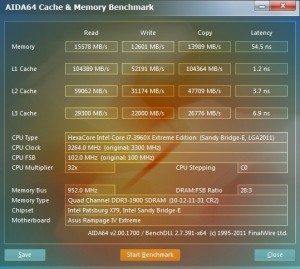GeIL Enhance Corsa DDR3 1333MHz 16GB Quad Channel Memory Kit Review
Andy Ruffell / 13 years ago
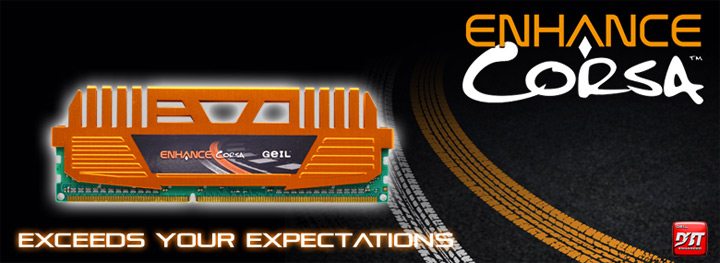
X79 is here and that simply means a change in the way that things are done. It doesn’t just mean a new motherboard and a new processor, but also a new memory architecture. In terms of Intel, X58 saw us utilising Tri-channel memory, whilst Sandy Bridge P67/H67 and Z68 saw the famous dual-channel memory being the chosen technology which rivalled AMD with the same tech.
X79 does things a bit differently though, by using Quad-channel memory will theoretically quadruple the memory’s available bandwidth as long as the modules are identical. GeIL have decided to be on the ball and have already got some quad channel kits ready for market and being honest, we’ve had it for quite some time, waiting for X79 to be released so that we can look into the potential of quad channel memory and what it can do.
Today sees us taking a look at their 1333MHz 16GB kit which is part of the famous and slightly new Enhance Corsa range of modules. We’ve seen the potential behind the dual-channel kit so let’s get straight in and see what these are all about.
This particular kit is part of the Enhance Corsa range, which means simply, that they are enhanced. Though the stock speed is 1333MHz, the modules themselves have been tested at 1500MHz with the same Case 9 latency.
Being a quad channel kit, the set consists of four 4GB memory modules, totalling a whopping 16GB. They feature bright orange EVO style heatspreaders which will go especially nice with the upcoming Gigabyte X79-UD7 OC board with the same colour scheme. The heatspreaders are quite tall, so be careful if you’re wanting to use them with quite a chunky CPU cooler as you may be disappointed.
Each 4GB memory module runs at 1333MHz but has been tested at 1500MHz with the same latencies. This immediately tells us that the modules have some headroom for overclocking, which we’ll look into a bit later on. The modules use timings of 9-9-9-24 and operate at 1.5V. Though the timings are quite tight, for a 1333MHz kit they aren’t astounding, but we’ll see what can be done with the timings when we look at overclocking.
Test system:
- Asus Rampage IV Extreme
- Intel Core i7 3960X
- Gigabyte GeForce GTX 580 SOC
- Corsair H80
- Corsahir HX1050W
- Kingston V+100 128GB SSD
- Lian Li T60
When we booted the computer into the BIOS, we made sure that all of the appropriate settings were correct and this involved setting the XMP profile and the memory frequency to 1333MHz. Once this was down we double checked the timings to make sure they matched up with the SPD of 9-9-9-24.
We then proceeded to check the stock performance of the modules, and being honest we’ve seen a lot worse, but we’ve also seen a lot better. For a 1333MHz kit it’s just below what we’d expect, but we have to remember that we’re running in quad channel opposed to what we’re used to, of dual channel.
Performance wise, we had a read speed of 14727 MB/s, a write speed of 12759 MB/s and a copy speed of 13961 MB/s. Looking at the latency, even this was not very good at 65.5 ns.
With quite disappointing results, we wanted to see if these modules clocked as well as we know the dual channel kit can clock, and pushed the divider to 1600MHz with the stock timings and simply raised the voltage to 1.65V from its stock 1.5V. We managed to boot into Windows and were eager to get back into the BIOS to see how we could push things further by slackening off the timings a little bit.
Due to the X79 board we have, we have a lot more settings to tweak around with in terms of the memory and loaded a pre-defined timings profile that gave us extremely loose timings that allow the memory to be pushed further in terms of bandwidth. With timings of 10-12-11-31 at 1.65V allowed us to push the memory to the 1866MHz divider and from then on, we knew the BCLK would have to be our friend.
We proceeded to push the BCLK up in very minor increments as we know from first hand usage it can be a bit temperamental to say the least.We managed to push it up slightly to get that little bit extra out of the modules.
Though at one point we did manage to get 105.8MHz, the stability clearly wasn’t there and shortly after, wouldn’t boot with those settings so we started to clock things back down again. Clocking things back down and trying again, we found 102MHz was the limit on the BCLK and even now, can’t figure out why 105.8MHz was once achievable, but not now or maybe ever again.
Sadly to get to this speed, the timings had to be loose as set by the profile on the Rampage IV board. With those pre-defined timings of 10-12-11-31, the overall clock speed gained was 1904MHz which is still fantastic considering this set of memory has a stock speed of 1333MHz.
After overclocking this memory from 1333MHz to 1902MHz, we wanted to see what kind of performance increase we would see, if any. We saw a slight increase with a read speed of 15578 MB/s, write speed of 12601 MB/s and a copy speed of 13989 MB/s and memory latency of 54.5. Being honest, these aren’t fantastic results considering the large increase in speed and can only assume that the quad channel technology has a part to play here.
We also found that the timings couldn’t really be tightened up as this led to instability when we booted into Windows, much like we saw with the higher overclock and we strive for 100% stability with all of the tests we do, especially when overclocked.
We’ve had a look at a few memory module kits from GeIL and a lot of them impressed us, but with this being one of the first quad channel kits we’ve seen, we wasn’t quite sure what to expect.
Sadly, we didn’t recieve results like we thought we would. We did manage to clock the memory very far, but the quad channel technology seems to be restricting things somewhere as the read, write, copy and latency results weren’t really anything to write home about, which is upsetting as we had high hopes for this kit.
If you are going over to X79, you’re most likely going to be an enthusiast, and for that reason we can’t see that you’d buy a 1333MHz kit in the first place, but would initially go for something a bit faster, such as 1600MHz upwards, so it will be interesting to see how we get on with the GeIL 1600MHZ 16GB quad channel kit when that gets put through its paces.
Price wise, you’ll find this item available for around £32 from most reputable retailers in the UK. As time goes on, we expect more retailers to start picking up these kits from GeIL as it’s still fairly new, but still fantastically priced.
Simply put, if you want a kit that can overclock fantastically then this is certainly one too look at, but don’t expect the best performance results from it, once you’ve got to that super high clock speed.
